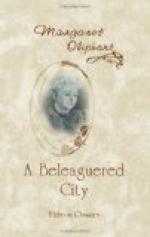‘Is it delusion?’ he said, ’O my God! or shall not even this, not even so much as this be revealed to me?’
To see a man who had so ruled himself, who had resisted every disturbance and stood fast when all gave way, moved thus at the very last to cry out with passion against that which had been denied to him, brought me back to myself. How often had I read it in his eyes before! He—the priest—the servant of the unseen—yet to all of us lay persons had that been revealed which was hid from him. A great pity was within me, and gave me strength. ‘Brother,’ I said, ’we are weak. If we saw heaven opened, could we trust to our vision now? Our imaginations are masters of us. So far as mortal eye can see, we are alone in Semur. Have you forgotten your psalm, and how you sustained us at the first? And now, your Cathedral is open to you, my brother. Laetatus sum,’ I said. It was an inspiration from above, and no thought of mine; for it is well known, that though deeply respectful, I have never professed religion. With one impulse we turned, we went together, as in a procession, across the silent place, and up the great steps. We said not a word to each other of what we meant to do. All was fair and silent in the holy place; a breath of incense still in the air; a murmur of psalms (as one could imagine) far up in the high roof. There I served, while he said his mass. It was for my friend that this impulse came to my mind; but I was rewarded. The days of my childhood seemed to come back to me. All trouble, and care, and mystery, and pain, seemed left behind. All I could see was the glimmer on the altar of the great candle-sticks, the sacred pyx in its shrine, the chalice, and the book. I was again an enfant de choeur robed in white, like the angels, no doubt, no disquiet in my soul—and my father kneeling behind among the faithful, bowing his head, with a sweetness which I too knew, being a father, because it was his child that tinkled the bell and swung the censer. Never since those days have I served the mass. My heart grew soft within me as the heart of a little child. The voice of M. le Cure was full of tears—it swelled out into the air and filled the vacant place. I knelt behind him on the steps of the altar and wept.
Then there came a sound that made our hearts leap in our bosoms. His voice wavered as if it had been struck by a strong wind; but he was a brave man, and he went on. It was the bells of the Cathedral that pealed out over our heads. In the midst of the office, while we knelt all alone, they began to ring as at Easter or some great festival. At first softly, almost sadly, like choirs of distant singers, that died away and were echoed and died again; then taking up another strain, they rang out into the sky with hurrying notes and clang of joy. The effect upon myself was wonderful. I no longer felt any fear. The illusion was complete. I was a child again, serving the mass in my little surplice—aware that all who loved me were kneeling behind, that the good God was smiling, and the Cathedral bells ringing out their majestic Amen.




